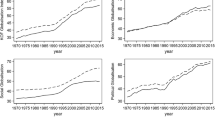Abstract
Schumpeter’s Capitalism Socialism, Democracy was typical of 1942 in being pessimistic about all three terms of its title. Socialism would come, he thought, but without liberalism. His historical evidence was necessarily imperfect in light of later scholarship. But so too is his economics, good in parts, but falling in with the pre-analytic vision of the “imperfections” of something called “capitalism,” neither of which has held up well. The book later became popular because it had his characteristic breadth of scholarship, especially historical, but also his ironic stance on almost all issues. What’s finally missing in Schumpeter’s grim prognoses, largely falsified by events, is an acknowledgment of the power of language. Ideas, words, rhetoric, ideology, language games—indeed the world is governed, said another economist, by little else. Denying it is the paradox of the conflicted materialist writer: while denying rhetoric, he enacts it, for what purpose is unclear.
Similar content being viewed by others
References
Bell, D. (1978). The cultural contradictions of capitalism. New York: Basic Books.
Cohen, E. (1992). Athenian economy and society: A banking perspective. Princeton: Princeton University Press.
Cowen, T. (2013). Average is over: Powering America beyond the age of the great stagnation. New York: E.P. Dutton.
Diamond, A.M. Jr. (2018). Personal correspondence with McCloskey
Diamond Jr., A. M. (2019). Openness to creative destruction: Sustaining innovative dynamism. New York: Oxford University Press.
Ferguson, N. (2018). The square and the tower: Networks, hierarchies and the struggle for global power from the freemasons to Facebook. New York: Penguin/Random House.
Galbraith, J.K. (1967) (2007). The New Industrial State. With a new introduction by Sean Wilentz and a new foreword by James K. Galbraith. Princeton: Princeton University Press.
Gerschenkron, A. (1957) (1962). “Reflections on the Concept of ‘Prerequisites’ of Modern Industrialization.” L’industria 2. Reprinted as pp. 31–51 in Gerschenkron, Economic Backwardness in Historical Perspective: A Book of Essays. Cambridge, MA: Harvard University Press.
Gilder, G. (2009). The Israel test. Minneapolis: Richard Vigilante Books.
Goldstone, J. A. (2002). Efflorescences and economic growth in world history: Rethinking the ‘rise of the west’ and the industrial revolution. Journal of World History, 13, 323–389.
Gordon, R. J. (2016). The rise and fall of American growth: The U.S. standard of living since the civil war. Princeton: Princeton University Press.
Hayek, F. (1977) (1992). “Interview by Thomas W. Hazlett.” Reason July 1992.
Higgs, R. H. (1997). Regime uncertainty: Why the great depression lasted so long and why prosperity resumed after the war. Independent Review, 1(Spring), 561–590.
Higgs, R. H. (2008). The complex course of ideological change. American Journal of Economics and Sociology, 67, 547–566.
Kirzner, I.M. (1976). “Equilibrium vs. Market Processes.” In Edwin Dolan, ed., The Foundations of Modern Austrian Economics. Kansas City: Sheed and Ward. In Liberty Fund, Library of Liberty.
Klamer, A., & McCloskey, D. N. (1995). One Quarter of GDP Is Persuasion. American Economic Review, 85(2, May), 191–195.
Krugman, P. (1998). “Ricardo’s Difficult Idea.” Unpublished teaching material at http://web.mit.edu/krugman/www/ricardo.htm
Langlois, R.N. (2002). "Schumpeter and the Obsolescence of the Entrepreneur." Economics Working Papers. 200219. http://digitalcommons.uconn.edu/econ_wpapers/200219
Levy, D.M. & Peart, S.J. (2009). “ Soviet Growth & American Textbooks. Working paper December 3. Available at SSRN: https://ssrn.com/abstract=1517983 or https://doi.org/10.2139/ssrn.1517983
Lodge, D. (1988) (1990). Nice work. London: Penguin.
Machlup, F. (1943). Capitalism and its future appraised by two Liberal economists. American Economic Review, 33(Jun.), 301–320.
Marx, K. (1867). Capital: A critique of political economy. Vol. 1. F. Engels, ed. Trans. 3rd German ed. by S. Moore and E. Aveling. New York: Modern Library, n.d.
Mazzucato, M. (2013). The entrepreneurial state: Debunking public vs. Private Sector Myths. London: Anthem Press.
McCloskey, D. N. (1990). If You’re so smart: The narrative of economic expertise. Chicago: University of Chicago Press.
McCloskey, D. N. (2016). Bourgeois equality: How ideas, not capital or institutions, enriched the world. Chicago: University of Chicago Press.
McCloskey, D. N. (2017). The Myth of Technological Unemployment" Reason August, 2017.
McCloskey, D. N. (2018). “The two movements in economic thought, 1700-2000: Empty economic boxes revisited.” History of Economic Ideas 2018.
McCraw, T. K. (2010). Prophet of innovation: Joseph Schumpeter and creative destruction. Cambridge: Harvard University Press.
Mueller, J. D. (1999). Capitalism, democracy, and Ralph’s pretty good grocery. Princeton: Princeton University Press.
Ozment, S. (2004). A mighty fortress: A new history of the German people. New York: Harper-Collins.
Polanyi, K. (1944). The great transformation. Boston: Beacon Press.
Pollard, S. (1981). Peaceful conquest: The industrialization of Europe, 1760–1970. Oxford: Oxford University Press.
Robinson, J. (1943). Review of Capitalism, Socialism and Democracy. Economic Journal, 53(Dec.), 381–383.
Samuelson, P.A. (1970). “Joseph Schumpeter.” Newsweek, April 13, p. 75.
Schumpeter, J.A. (1911). The Theory of Economic Development. English trans. From the 1926 German edition. Cambridge, MA: Harvard University Press, 1934.
Schumpeter, Joseph A. 1926 (1934). First German revision of Schumpeter 1911.
Schumpeter, J.A. (1939). Business cycles: A theoretical, historical, and statistical analysis of the capitalist process. Two vols. New York NY: McGraw-Hill.
Schumpeter, J.A. (1942) (1950). Capitalism, Socialism and Democracy. 3rd. ed. New York: Harper and Row, 1950. Richard Swedberg, ed., Taylor & Francis e-Library, 2003, from which all quotations are taken. At http://cnqzu.com/library/Economics/marxian%20economics/Schumpeter,%20Joeseph-Capitalism,%20Socialism%20and%20Democracy.pdf
Schumpeter, J. A. (1947). The creative response in economic history. Journal of Economic History, 7, 149–159.
Schumpeter, J. A. (1949). Science and ideology. American Economic Review, 39(2), 346–359.
Schumpeter, J. A. (1950). The march into socialism. American Economic Review, 40(2), 446–456 Reprinted in subsequent editions of CSD.
Schumpeter, J.A. 1954. History of Economic Analysis. Elizabeth Boody Schumpeter ed. London: Allen & Unwin.
Smith, F. (2015). “A new history of American business.” Forbes Sept. 8.
Sombart, W. (1913). Krieg und Kapitalismus. München: Duncker & Humblot.
Sylla, R., & Toniolo, G. (Eds.). (1992). Patterns of European industrialization: The nineteenth century. London: Routledge.
Walls, L. D. (2017). Thoreau: A life. Chicago: University of Chicago Press.
Wex, M. (2005). Born to kvetch: Yiddish language and culture in all its moods. New York: St. Martin's Press.
Yunus, M. (2010). Building social business: The new kind of capitalism that serves Humanity's Most pressing needs. New York: Public Affairs Press.
Acknowledgements
I thank Arthur M. Diamond, Jr. of the University of Nebraska Omaha for his detailed and illuminating comments on a draft, and not Jeffrey Friedman.
Author information
Authors and Affiliations
Corresponding author
Additional information
Publisher’s note
Springer Nature remains neutral with regard to jurisdictional claims in published maps and institutional affiliations.
Rights and permissions
About this article
Cite this article
McCloskey, D.N. Schumpeter the incomplete rhetorician. Rev Austrian Econ 35, 423–443 (2022). https://doi.org/10.1007/s11138-020-00530-9
Accepted:
Published:
Issue Date:
DOI: https://doi.org/10.1007/s11138-020-00530-9




